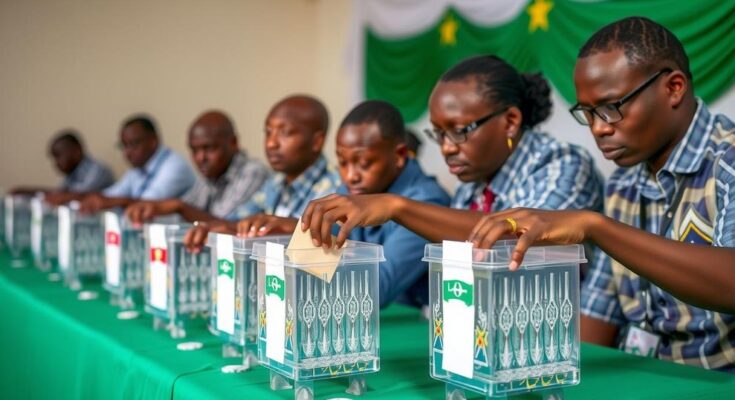Voting for a new 33-seat parliament is underway in the Comoros, amidst allegations of past election irregularities regarding President Azali Assoumani’s governance. Around 338,000 voters are registered, with nearly 100 candidates contesting. While some opposition parties advocate for a boycott, others argue participation is vital to expose the regime’s flaws. Results are expected by Friday.
Voters in the Comoros are participating in parliamentary elections to fill the 33-seat assembly, occurring a year after President Azali Assoumani’s re-election, which has been marred by claims of significant electoral irregularities from the opposition. The ruling party has disputed these allegations. Polling commenced early on Sunday, with approximately 338,000 registered voters in the Indian Ocean archipelago, which last held parliamentary elections in January 2020. Almost 100 candidates, approved by the Supreme Court, are contesting this election.
President Assoumani, who assumed power in 1999 via a coup and has successfully won three subsequent elections, faces accusations of autocratic governance. His critics suspect his intentions to pave the way for his eldest son, Nour El-Fath, as his successor upon the completion of his current term in 2029. In 2024, Assoumani granted his son extensive authority to oversee government operations. While some opposition groups, including Juwa led by former President Ahmed Abdallah Sambi—currently serving a life sentence—advocated for a boycott, certain factions rejected this call.
Hamidou Karihila from the opposition Hope of the Comoros party articulated the viewpoint that engaging in the elections serves to reveal the weaknesses within Assoumani’s administration and can hasten its downfall, stating, “The Azali regime is weakened … by participating in these elections we are contributing to further exposing the flaws in its system and accelerating its inevitable fall.” Results from the election are anticipated by the upcoming Friday.
The Comoros is an Indian Ocean archipelago known for its political instability, frequently marked by coups and contested elections. Since its independence, the nation has struggled with governance issues, often leading to accusations of electoral misconduct and authoritarianism. The re-election of President Azali Assoumani in 2022 reignited tensions among political factions, particularly as he has been accused of consolidating power and intending to establish a dynastic succession. The current elections provide a significant litmus test for both the ruling party’s legitimacy and the resilience of the fragmented opposition.
In conclusion, the ongoing parliamentary elections in the Comoros highlight a critical period in the nation’s political landscape, where the incumbent President Azali Assoumani faces scrutiny and distrust from various opposition factions. As voters head to the polls amidst allegations of irregular practices and with the shadow of authoritarian rule looming, the outcome could significantly shape the future governance and political dynamics in the Comoros. The engagement of the opposition, despite calls for boycott, reflects a commitment to holding the regime accountable.
Original Source: www.areanews.com.au




